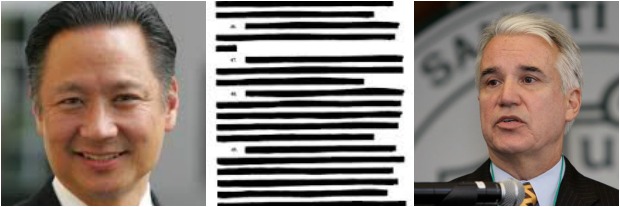
Since George Gascón took office, staffers have been redacting email addresses and phone numbers of witnesses—making it that much harder for the Public Defender’s investigators to conduct interviews vital to their clients interests, according to Public Defender Jeff Adachi.
The move has cost tax-payer dollars by slowing down pre-trial activity—sometimes by weeks—is preventing Adachi’s office from negotiating fair plea agreements, and often leaves suspects in custody longer than is necessary, according to staffers in the Public Defender’s office. Redacting such contact information adds between two hours and two days of work for an investigator.
“We’re trying to eliminate gamesmanship, it shouldn’t be about not having access to a witnesses phone number,” Adachi told the Appeal, “It means delays in the case, and often cases that should be heard quickly have to be continued.”
What should be a “30 second phone call” often instead means an investigator must drive to a witness’ home to make contact, and in some cases it requires a few trips, Adachi said.
In one instance an investigator had to drive to San Leandro several times in order to conduct a brief interview with a witness, said Kwixuan Maloof, Managing Attorney of the Public Defender’s felony unit. The main consequence is that Maloof’s clients often spend more time in custody than necessary, because the cases are dragged out, Maloof said.
In another case, Adachi told the Appeal, a prosecutor instructed a witness not to talk with defense counsel.
Investigators do have access to a search system, making retrieving a phone number possible in some cases. However, if the witness has a common name, “four or five” phone numbers might appear, making it a challenge to identify the correct person.
Removing phone numbers and email addresses from case files is a “pretty awful” move, that’s “beneath” the D.A.’s office, according to a legal scholar.
“It’s unprofessional, and unduly petty,” said Peter Keane, law professor at Golden Gate University, “It doesn’t speak well for the overall level of operation of a prosecutors office, especially in a sophisticated city like San Francisco.”
The Public Defender’s office even conducted an informal survey of nearby counties—and the results indicated that the majority of counties provide phone numbers, Adachi said. Generally, the only instances Adachi could find where witness contact information was routinely redacted were sex crimes and gang related cases, as doing so protects the witnesses—and victim—from sometimes violent retribution.
Such redactions are typical—but according to Adachi, the D.A.’s office is redacting information across the board.
The D.A.’s office maintains that it’s acting appropriately. “We go above and beyond our discovery obligations,” said District Attorney spokesman Alex Bastian, “As it relates to certain sensitive information, we check in with witnesses and victims to see if they are with the release of additional information, not required by the law.”
According to Adachi, his office has made a written request to the D.A., hoping to put an end to the redaction practice, but it has thus far been ignored. For a short time, Adachi admits, the D.A. was instructing deputies to ask witnesses if they agreed to having their phone numbers and email addresses released to Adachi’s office, but “I got the sense that they sort of blew that off.”
Despite the D.A.’s claim that redacting such information is appropriately following legal guidelines set out in the California Penal code, Keane believes that providing such contact information is “part of a professional obligation” to cooperate with counsel on the other side.
“They know counsel has to interview witnesses, and they shouldn’t put the defense through it,” Keane said.
“It shows no class.”









